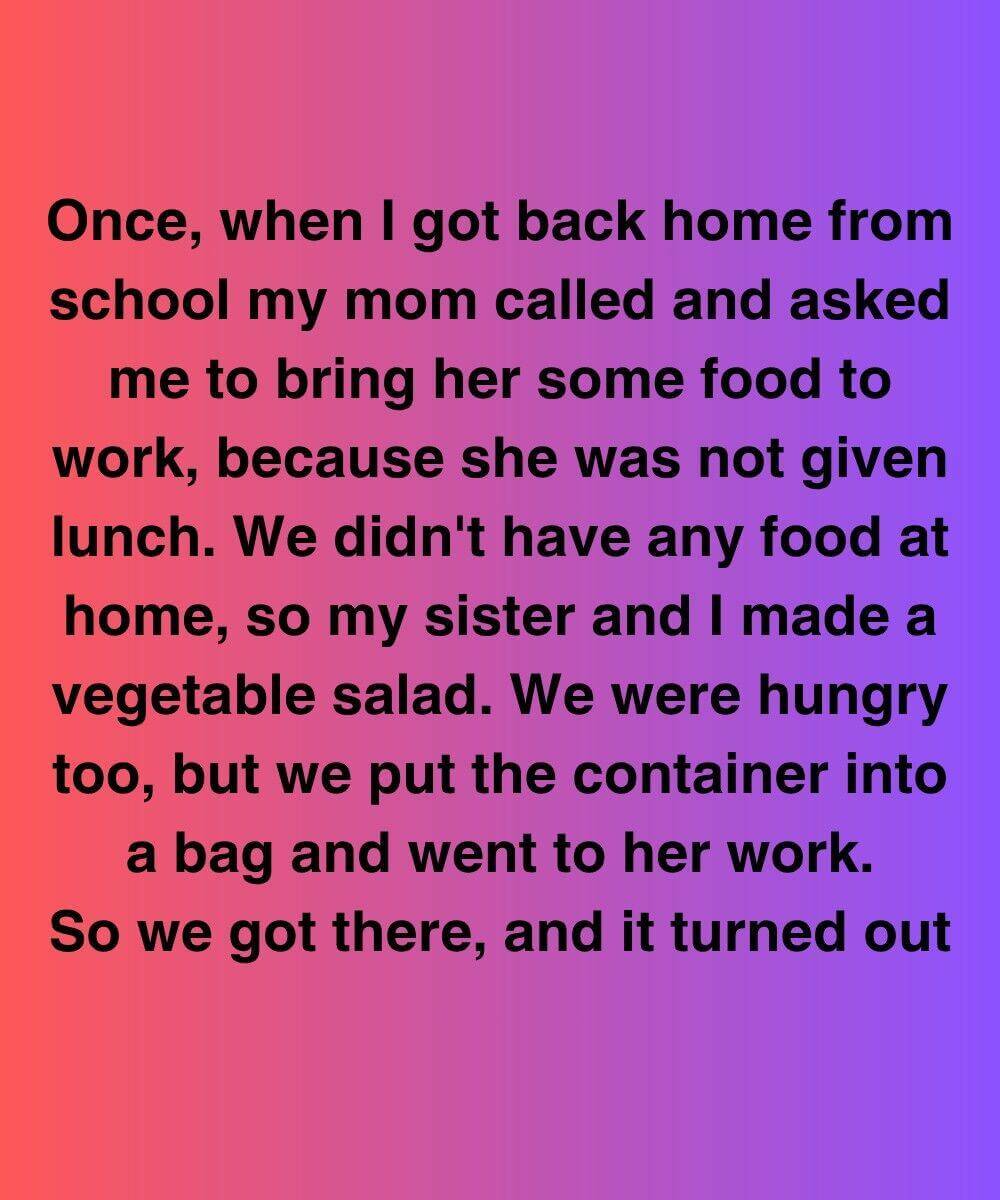You never realize how a small act of sharing can change lives—until it happens to you.
That afternoon, I walked in from school and found my mom calling me with a favor. She hadn’t eaten lunch at work and was hungry. Our fridge was nearly bare, only a few lonely vegetables staring back at us. My sister and I scrambled together the simplest salad we could, even though our own stomachs were growling. Then we packed it carefully and brought it to her workplace.
When we arrived, she was in the breakroom with Mrs. Danika, a soft-spoken woman in her fifties who looked utterly drained. My mom’s face lit up at the sight of us, but her eyes immediately flicked to the salad container.
My sister handed it over, and my mom dove in like she hadn’t eaten all day. Then she noticed Mrs. Danika, who hadn’t eaten either. Her card had been declined at the vending machine—again. Without hesitation, my mom split the salad in half, insisting Mrs. Danika eat, despite her protests. “You think these kids would let me eat without sharing?” she said with a weary smile.
It wasn’t dramatic or cinematic. Just two people quietly sharing their hunger, and for me, it was a revelation.
That evening, my sister and I shared the last slice of bread in the apartment. No butter. No fanfare. Just a quiet understanding of what it meant to make do. But something had shifted in me. I started noticing the little things—the skipped meals, my mom’s patched-up shoes.
The next few months were rough. Mom juggled two part-time jobs, coming home exhausted and smelling of bleach. My eleven-year-old sister had already learned to cook rice and manage the laundry. We never said we were poor; we just lived it.
Then came a call from Mireya, a woman starting a community support group for single parents. She’d heard about my mom from Mrs. Danika. At first, Mom hesitated, but Mireya’s kind voice convinced her to give it a chance.
On Wednesday, we took the bus to the library. Inside a small room, about ten people had gathered. Soup, bread, and snacks were laid out like treasure. I ate two bowls without guilt. The group discussed food stamps, job leads, and free health clinics. It wasn’t just support—it was hope in human form.
Mireya helped Mom secure childcare grants and rewrite her résumé. Within a month, she landed a full-time hospital janitor job with steady pay and health insurance. My sister and I joined a weekend program offering free lunches and tutoring. Slowly, our world brightened.
Life threw us another curve. Mrs. Danika lost her eleven-year-long job without severance. Mom invited her to stay with us. Our tiny one-bedroom became a home for four; my sister and I slept in the living room. For six weeks, they searched for jobs together over instant coffee, building a little network of hope in our cramped apartment.
Then came the surprise. Mrs. Danika invited us to what we thought was a casual potluck. We walked into a hall decked with lights and decorations. She had nominated Mom for the “Most Impactful Community Ally” award. Her letter was read aloud: “She gave me half a salad when she barely had enough for herself. She shared her home, her warmth, her hope. I am standing today because she didn’t let me fall.”
Mom was stunned, teary, proud. For the first time, she truly saw her own worth.
After that, volunteering became part of our lives. Mom at the nonprofit, my sister and I handing out food boxes, even tending to small pots of herbs on our balcony. Those herbs made our meals feel intentional, not just survival.
One Saturday, I was thirteen and translating at an outreach event. I helped a mother and her shy son sign up for housing and food assistance. Their smiles—the first in months—hit me harder than any meal ever could. Helping felt like having enough, in a way hunger never did.
Years later, Mom became a hospital supervisor. Mrs. Danika now leads the nonprofit’s volunteer program. Every Christmas, she brings tamales with a note: “Thank you for that salad.” I went to college first in our family and now run a youth outreach center. My sister helps on weekends. The shy boy I helped years ago? He’s one of our volunteers now.
Looking back, that small salad wasn’t just food. It was a seed of care, a quiet stand against scarcity, a gesture that multiplied hope instead of taking from it.
Sometimes, it’s the smallest act—sharing your last meal—that changes everything. That salad didn’t just feed three people. It fed a future.
